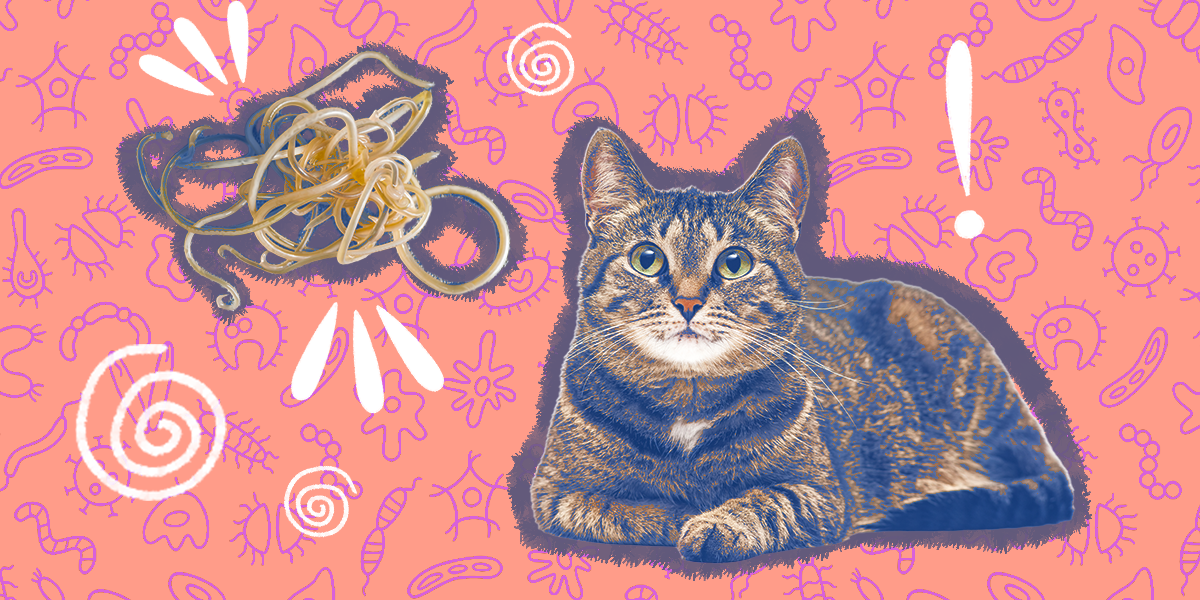Everything Pet Parents Need To Know About Worms In Cats - The Dodo

The thought of your BFF dealing with parasites can be a little worrying (and icky), but there are a bunch of things you can do to keep your cat safe from these pests.
And when it comes to worms in cats, your approach is going to be different for each type of parasite, according to Ashley Callihan, a licensed veterinary nurse with DodoVet.
Types of worms in cats
There are several types of parasitic worms in cats. Some of the most common include:
How do cats get worms?
The way cats get worms is a little different depending on the type of worm.
Kittens can get roundworms during birth or while nursing from their mother if she's infected. But cats can also get infected with these pests by coming into contact with contaminated poop from infected animals.
But to get tapeworms, fleas are the culprit. They carry these worms, and your cat would have to actually eat an infected flea to become infected himself.
"If a cat has fleas and ingests one, they also ingest the tapeworm," Callihan told The Dodo.
Cats get hookworms a little similarly to the way they get roundworms — by coming into contact with contaminated soil where an infected animal has pooped. For example, if your cat walks across an affected area and then licks his paws, he could get infected.
And when it comes to heartworms, those parasites are actually passed to cats by mosquitoes.
Symptoms of worms in cats
The symptoms of worms in cats will also vary depending on which type your BFF is dealing with.
Roundworms
If your cat has a lot of roundworms, he may show symptoms like:
- Pot-bellied appearance
- Vomiting
- Diarrhea
- Slowed growth
- Abdominal pain
- Dull coat
"While roundworms don't pose a huge threat to healthy adult cats, kittens with a high worm burden can become severely ill, and they can even be fatal," Callihan said.
Tapeworms
When your cat gets tapeworms, the parasites latch onto his intestinal wall with their mouths and feed on the nutrients your cat's digesting.
According to Callihan, these worms aren't typically too harmful. But if your cat has a lot of them, is young or has health issues, tapeworms could cause symptoms like:
- Weakness
- Weight loss
- Scooting
- Vomiting
- Diarrhea
Regardless of how severe your cat's infection is, you may spot bits of these worms in his poop.
"We typically notice tapeworms by seeing them on our cat or in the litter box," Callihan said. "The worm itself is flat and segmented, and the segments break off and look like rice around our cat's anus or in the fur."
Hookworms
Like tapeworms, hookworms also attach to your cat's intestines but feed on his blood instead. This could lead to symptoms like:
- Anemia
- Weight loss
- Black, tarry poop
- Coughing
- Lesions on his paws
- Lack of appetite
- Diarrhea
- Constipation
"Hookworms can be incredibly dangerous for cats, as they can cause anemia and be life threatening," Callihan said.
Heartworms
The scary part about heartworms is that most cats won't show any symptoms. If your cat does manage to show symptoms of heartworm disease, they could look like:
- Coughing
- Difficult or rapid breathing
- Weight loss
- Vomiting
- Sudden death
It's super scary to think about, but there's good news: Cats are more resistant to heartworms than dogs. (But you should still take heartworm exposure seriously.)
How to get rid of worms in cats
If your cat has worms, there are a couple things you can do (depending on the worm).
Cat dewormers
The good news is there are a bunch of dewormers out there specifically designed for cats.
"Unfortunately, there isn't one dewormer that treats all four of these different worms, so your vet might recommend a few different dewormers," Callihan said.
So you'll want to chat with your vet to figure out which dewormers are right for you.
Heartworm treatment
If you're looking to treat your cat's heartworms, that's kind of tricky.
It's possible to get surgery to physically remove the worms, but it's not always recommended. So the most common heartworm treatment is actually no treatment.
Instead, regular screening can help you figure out if your cat's heartworm infection passed.
Prevention
Like with most things, prevention is actually the best treatment.
There are plenty of heartworm prevention medications that also protect against other worms. And flea preventatives will keep him safe against the pests that'll give him a tapeworm.
So if you're worried about worms in cats, make sure to get yours on preventative medication ASAP. And if your BFF does come in contact with these parasites, call your vet to find out the best course of action.
Want access to a vet 24/7? With DodoVet, you can connect via video chat, phone or text with an empathetic veterinary expert who can help you be the best pet parent you can be. Say goodbye to Dr. Google and have all your pet parent questions answered anytime, anywhere. Learn more here.
Comments
Post a Comment